FCM put Equity into Action with Help from Power Platform and AI
Project
Equity Lens Tool
Industry
Public Service | Non-Profit
Technology
Microsoft Power Platform (Power Apps, Power Pages, Power Automate, Dataverse), Microsoft SharePoint, OpenAI
About
Since 1901, the Federation of Canadian Municipalities (FCM) has been a national voice for more than 2,100 municipalities. FCM has made efforts and investments toward becoming a leading anti-racist, equitable and inclusive organization. This has required a wider and deeper lens into how FCM and its board operates, governs, influences and partners. As a result, considerable actions have been taken to realign its focus, systems and current practices to address and centre anti-racism, equity and inclusion (AREI). One of these actions included the development of the Equity Lens tool, an internal tool used by FCM staff.
The Challenge
FCM needed a new resource to enhance policies, programs, initiatives, and funding for all equity-deserving groups, and to facilitate a deeper comprehension of the obstacles they face. An Equity Lens tool was developed for this purpose. It was housed on an Excel spreadsheet, and was siloed, without the ability to collaborate. They needed a new version that is user-friendly, could help staff collaborate better with enhanced ability for data collection.
“We wanted it to be an online tool that teams can jointly use together, rather than individually, to ensure objectivity and a more robust perspective of FCM initiatives,” says Titi Eluwa, Lead, Equity, Inclusion Research and Evaluation, at FCM.
It was vital that the Equity Lens tool be extremely user-friendly. At the time, resources — like a guide to answering the questions, among others — were stored discretely, and the future version would have to act as a knowledge repository as well for FCM employees.
Ensuring accessibility, the tool had to comply with AODA standards, offer bilingual support, and be responsive across all devices, providing FCM with a streamlined process for adding future content to the portal.
The ability to create and monitor outcome oriented KPIs — including the number or percentage of new initiatives that are embedded with the Equity Lens impact statements — to measure and evaluate the impact of actions was also key. The Equity Lens guides users through a series of questions designed to evaluate FCM initiative's impact on various equity-deserving groups, considering intersectionality factors like age, race, gender identity, orientation, disability, and religion. It involves assessing internal and external environmental factors, such as political, socio-economic, and socio-cultural influences. The tool also provides solutions to barriers and negative impacts.
Ultimately, FCM needed to implement an Equity Lens tool for planning and executing initiatives with a focus on AREI and measurable impact, providing a more structured and consistent approach to identifying needs, designing interventions, and evaluating outcomes.
The Solution
It was imperative to use a solution that would work with FCM’s existing tech stack, support both English and French users and provide a flexible, scalable base that could grow and evolve with the organization’s future business needs.
Whitecap used Power Pages to build a responsive, mobile-friendly internal website to host the Equity Lens tool and resources for the FCM staff. It allows the data that is collected to be safely stored and provides full control of who has access with clearly defined authorization rules.
Power Pages allowed Whitecap to create a consistent, streamlined user experience with a customized interface that included views, forms and dashboards. FCM employees can easily log in, and intuitively understand how to create, update or deactivate AREI questions as well as automatically generate impact statements.
“We can now integrate the Equity Lens into our employee’s tasks, even their daily tasks. Applying the Equity Lens to everything we do is crucial because it ensures that everybody is integrated into our work – no one's left out. It also confirms that we are responding to the right needs of our communities, thereby saving costs,” notes Eluwa.
A model-driven Microsoft Power App is used in the background with real-time workflows to bring the data into the Dataverse and transform it into a format needed for search, reporting and team collaboration.
Several workflows were automated to minimize repetitive tasks. For example, the consolidated impact statement is automatically generated based on the concatenation of all the answers. And when the impact statement is completed, the relevant stakeholders are notified via email.
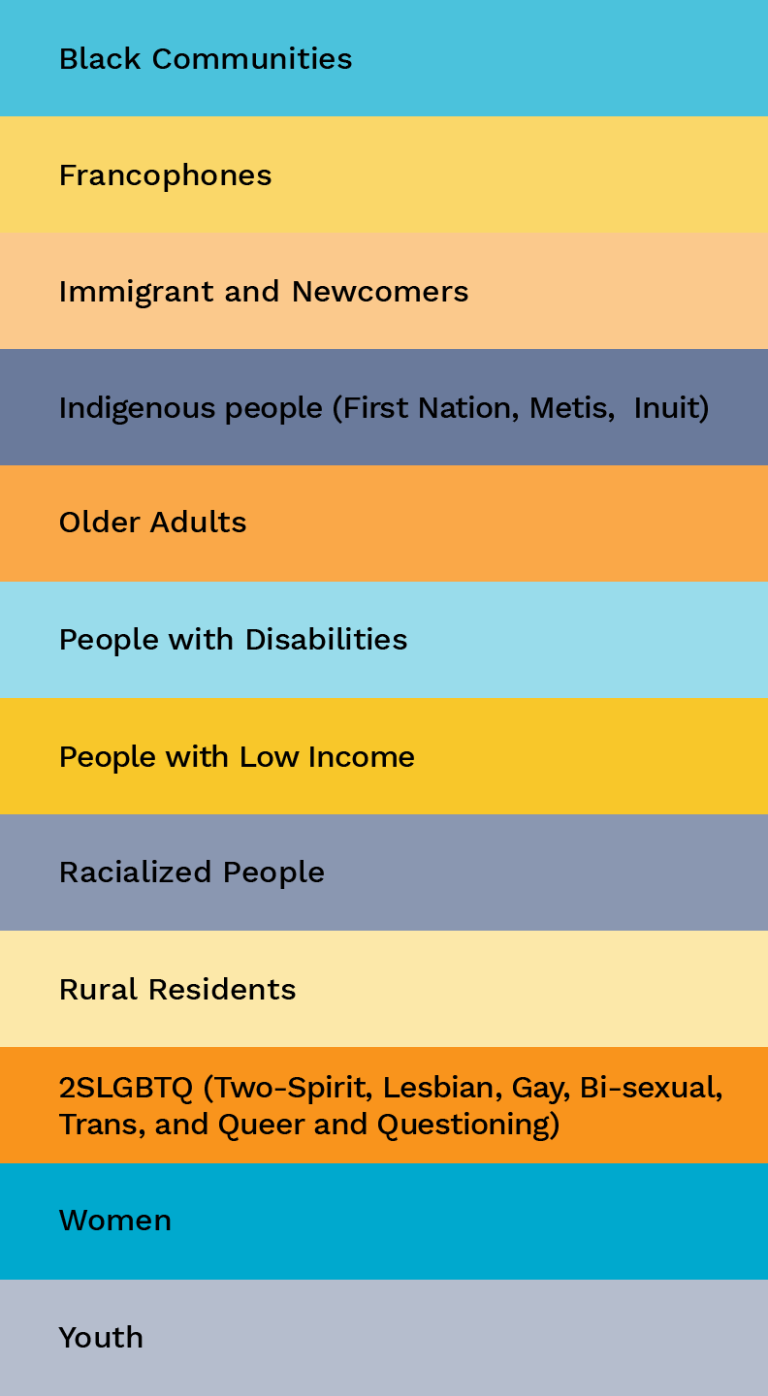
Snapshot of Equity Deserving Groups
Enhanced User Experience
Users log into the Equity Lens tool and are guided through a series of questions. They can also see all statements they have generated as well as those shared by colleagues. The design has an intuitive interface for easy navigation through all the steps, resources and tools.
“The website had to be visually appealing and easy-to-use for our people. When we saw the prototype, we were very impressed,” states Eluwa. “We are now able to include different resources so that our people don’t have to open different browsers because all the resources they need to answer the Equity Lens questions are intuitively right where they need to be.”
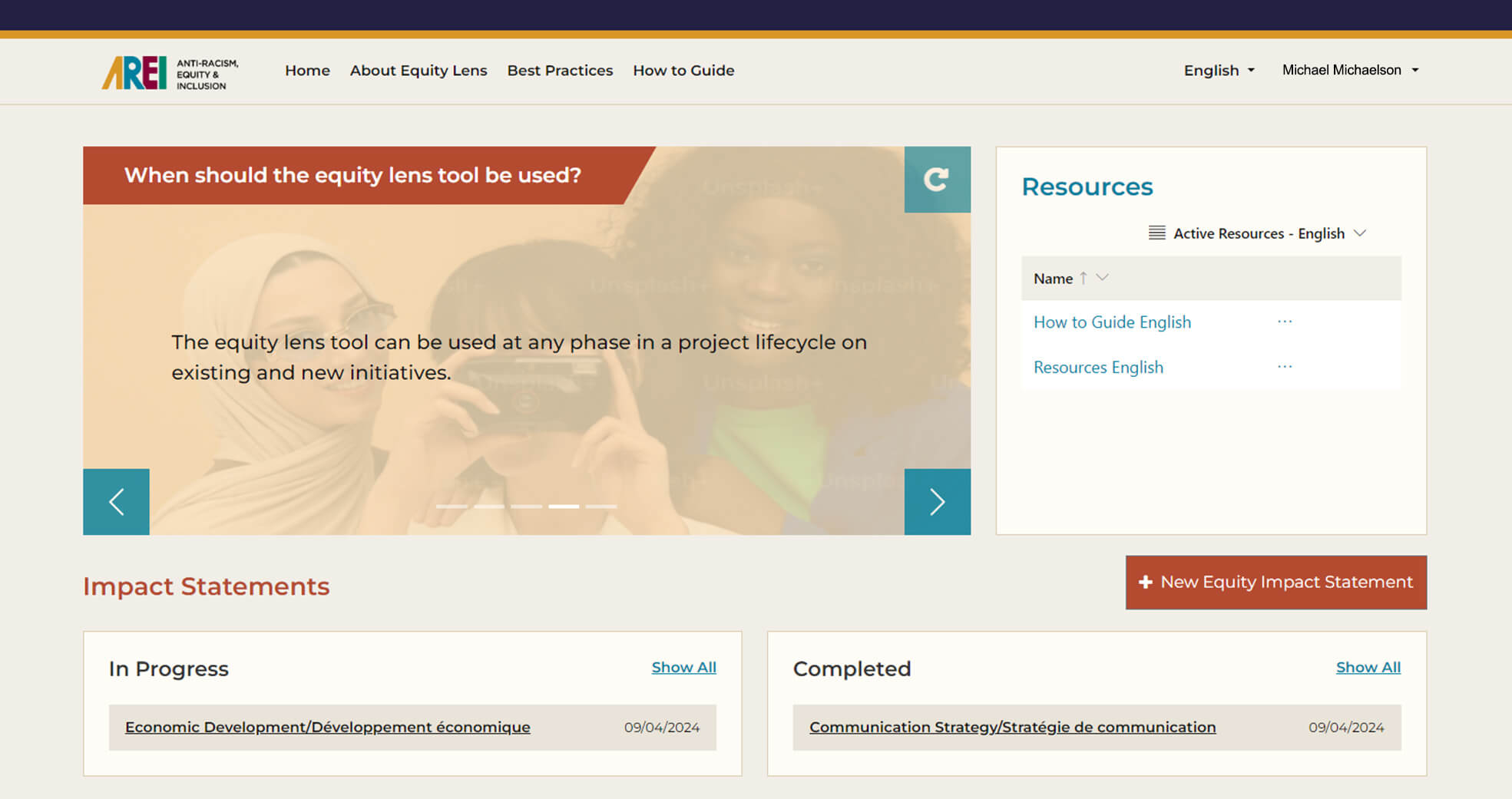
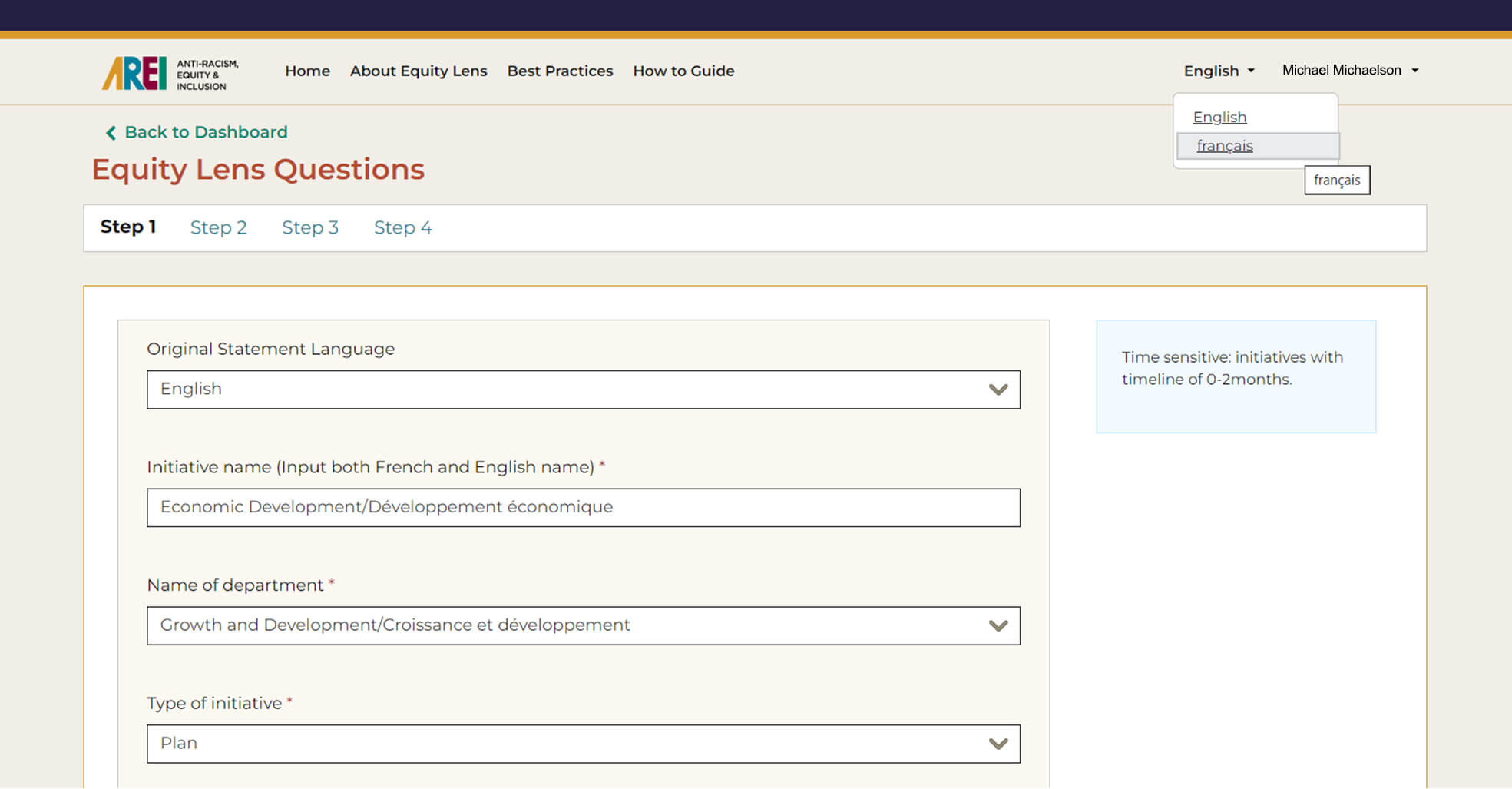
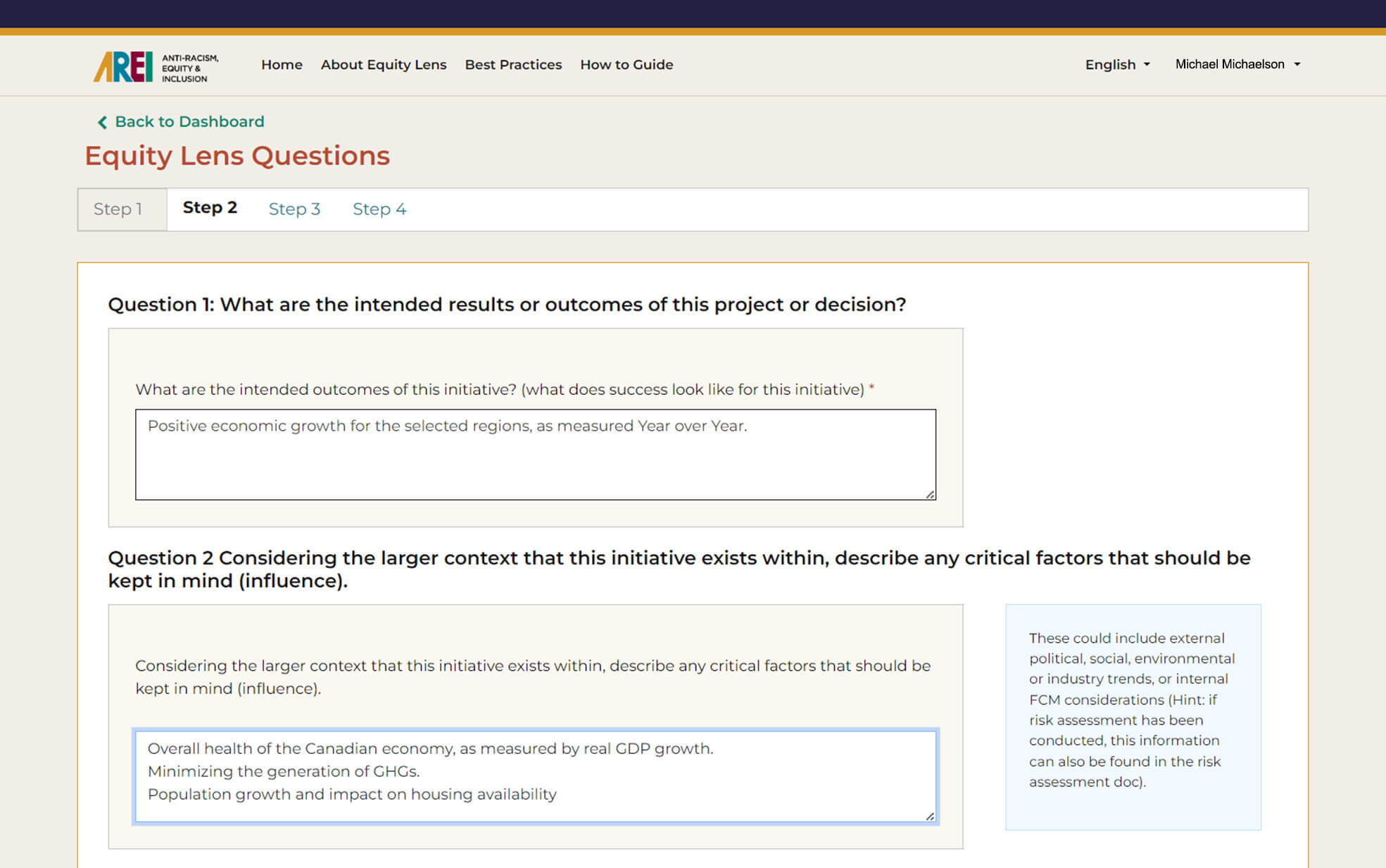
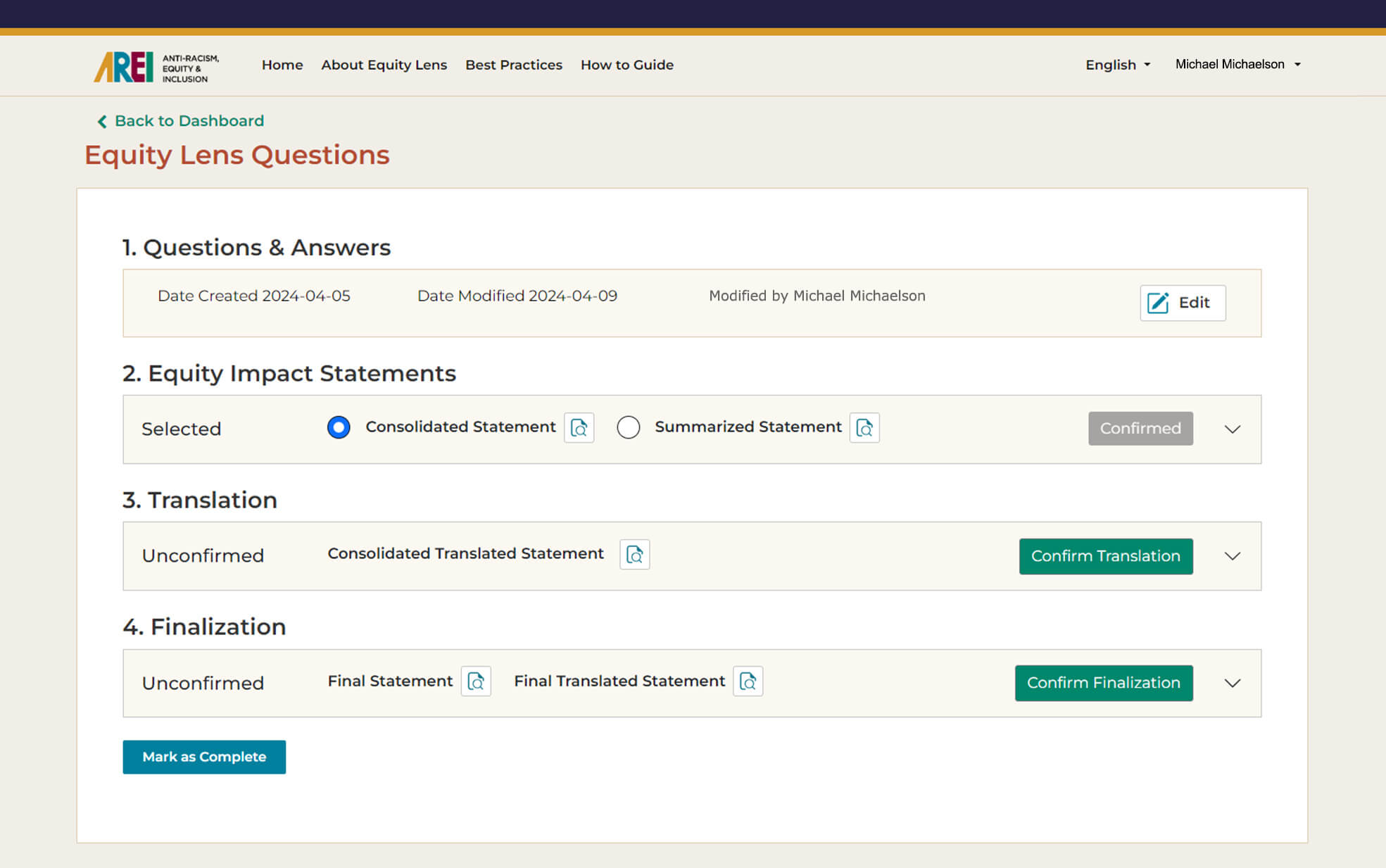
Robust Data Management
Implementing a robust data storage system capable of securely storing user responses and Equity Lens reports for review was a key part of the project. Using Microsoft Dataverse gives FCM superior data management functionality, allowing authorized users to export data for analysis and reporting or connect directly to the Dataverse via Power BI.
Whitecap implemented different access levels, including viewing and editing permissions with track change function, allowing users to monitor modifications made to assessments. The solution is also fully SSO-enabled for added convenience.
Accessible to All
Ensuring accessibility, the website is designed to be fully responsive, enabling optimal viewing on various devices, including desktops, tablets, and smartphones. Additionally, the Equity Lens tool complies with AODA (Accessibility for Ontarians with Disabilities Act) standards. This means the website and tool can be used using assistive technologies or navigated by keyboard only. All UX/UI choices – from wireframes to final design – were inclusive, so that content can be accessed and used by everyone regardless of ability or circumstance.
Lastly, the tool had to offer bilingual support, providing FCM with a streamlined method of better serving their staff and key stakeholders.
We're happy to be working with Whitecap. We are getting more than the value for money; we are also getting insights and advice, as they continually bring ideas to the table on how to make the tool better for everyone.
Lead, Equity, Inclusion Research and Evaluation, Federation of Canadian Municipalities
AI-Driven Reporting
The completed impact statements are quite lengthy. Whitecap saw an opportunity to integrate an Auto Summarize feature powered by an OpenAI API. This functionality streamlines the extraction of key insights, providing users with concise information for improved efficiency and understanding.
In addition, an AI-driven Auto Translate feature was incorporated to ensure seamless translation of content, enhancing accessibility for users with diverse language preferences.
The result is an auto-generated, succinct impact statement summary that can then be automatically shared with colleagues.
“When we started this process, we didn't think of using AI. Whitecap was innovative and felt that it would bring added value to the project,” says Eluwa. “Now, we can capture the responses to the questions and automate a statement and summary, in both French and English, that covers outcomes, the impact on equity-deserving groups, the actions to take, and how we will measure them.”

Easier Impact Analysis
Thanks to the Microsoft Power Platform, the Equity Lens tool offers up a consistent framework for examining all FCM initiatives and policies in a way that is easy to manage, review and act on. AI-driven automation greatly reduces staff workloads (each statement could take an hour or more to summarize manually) and presents a summary of the impacts in an easy and actionable way.
The new online tool also allows FCM to examine internal processes, like hiring and recruiting to be able to ensure a diverse range of employee candidates, and that equity-deserving employees are advancing at the same rate as their colleagues.
We are aiming for at least 90% of new initiatives to be informed by the equity impact statements generated. With every generated statement, it means that we have considered the impacts on individuals and groups. Going forward, we will want to know how many of those statements resulted in a plan or objective or outcome that was integrated into that initiative.
Lead, Equity, Inclusion Research and Evaluation, Federation of Canadian Municipalities
Future Projects & Enhancements
FCM was clear that they wanted scalable platform that could ensure that the website remains relevant and effective over time as the Equity Lens changes and evolves. A future enhancement will give FCM the ability to connect to the data source with Power BI and create dashboards reporting on user activity, overall projects, project stages and more.